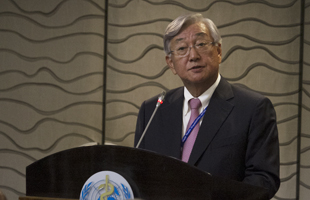
Representatives of Member States are scheduled to spend the next five days discussing the following items:
- reducing the impact of dengue on communities and Aedes mosquito-control issues to prevent and control Zika and chikungunya;
- practical strategies for countries to enhance health and environment programmes through governance and capacity, networking, communication and financing, based on the Sustainable Development Goal targets and indicators;
- strengthening surveillance and response to malaria to reduce its burden on marginalized groups and communities;
- guiding Member States on policy and programme priorities, implementation options, monitoring and health sector capabilities for achieving the Sustainable Development Goals;
- preparing the Region to respond to threats such as emerging diseases and public health emergencies; and
- reviewing progress on HIV and sexually transmitted infections, the Expanded Programme on Immunization, disability prevention and rehabilitation including blindness, regional action plan for healthy newborn infants, antimicrobial resistance and essential medicines.
In his keynote address to the Regional Committee, Dr Shin Young-soo, WHO Regional Director for the Western Pacific, paid homage to WHO Director-General Dr Margaret Chan, whose term finishes in June 2017. He extolled her many accomplishments and called her a "proud daughter of the Western Pacific".
"Under Dr Chan's leadership, WHO has launched extensive self-motivated reforms. She has made the Organization more effective and efficient, and much more responsive to Member States," said Dr Shin. "Margaret and I became friends long before assuming our current posts. Nevertheless, I think I speak for all the regional directors and ministers when I say she will be sorely missed," he added.
Dr Shin then highlighted the achievements and challenges of the Region over the past year. He said the Region's proactive approach has resulted in significant progress against the most serious threats to health.
- The Region has maintained its polio-free status and continues to set the pace globally in combating hepatitis. The Region has also reached the target of less than 1% chronic hepatitis B infection in 5-year-old children—a full year and a half ahead of the 2017 deadline.
- Countries are moving beyond immunization. WHO is strengthening support to address the needs of people living with viral hepatitis and to attain medications to cure the disease wherever possible. The past year was a milestone for tuberculosis control. A new treatment course for drug-resistant tuberculosis is much shorter, which is envisaged to improve adherence to the regimen to fight multi-drug resistance. The fight against malaria and dengue are continuing according to plan.
- WHO is continuing to invest in preparedness against emerging infectious diseases, especially in between outbreaks and emergencies. Twenty out of 27 States Parties have achieved core capacities under the International Health Regulations, known as IHR 2005. A new Asia Pacific Strategy for Emerging Diseases will make the Region more able to deal with whatever outbreak, disaster or health emergency.
- Clinical practices for newborn babies in more than 2200 facilities across the Region have improved, with more than 27 000 health workers coached in newborn care.
- Unsafe water, sanitation, air pollution, climate change and other environmental health risks have also been given more focus.
- The Region has started a five-year project to help build climate-resilient health systems in the Pacific. This aims to strengthen governance and polices, early warning systems, and service delivery.
Dr Shin also mentioned that WHO is eager to support Member States in prioritizing actions to achieve the Sustainable Development Goals. "The Regional Committee will consider for endorsement this week the Regional Action Agenda on Achieving the Sustainable Development Goals in the Western Pacific," said Dr Shin.
In her final address to her home region, Dr Chan said, "Like most people, I have a special fondness in my heart for places where I feel at home."
Dr Chan acknowledged the Region's diversity in terms of culture, socioeconomic development, climate, geography and population size, from very large countries to small island nations. She also mentioned that the health threats faced by the Region are equally diverse.
Dr Chan noted that despite these, "What holds this diverse Region together is the exceptionally strong spirit of solidarity and the need for a collective response to threats, whether these are widely shared or found mainly in poor and marginalized populations."
"It is this sense of collective responsibility and the sharing of experiences that helps explain why the poorer countries in the Region are such big over-achievers. The progress that results is readily apparent in the ambitious strategies and action plans being considered by this committee," she added.
Dr Chan also congratulated the governments of Cambodia, Cook Islands, Niue and Vanuatu for eliminating lymphatic filariasis as a public health problem.
"This achievement is the culmination of more than a decade of accelerated efforts of governments, development partners, and donors, supported by WHO. I thank this region for leading the world in the battle against lymphatic filariasis, and many other threats to health, both new and old," said Dr Chan.
For further information, please contact:
Mr Ruel E. Serrano
Public Information Office
WHO Regional Office for the Western Pacific
United Nations Avenue corner Taft Avenue, Manila, Philippines
Telephone: +632 528 9993
Email: serranor@who.int




